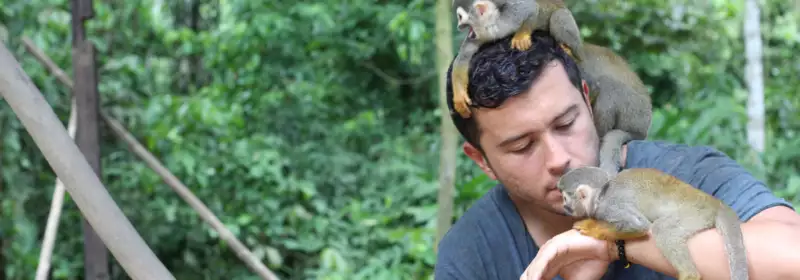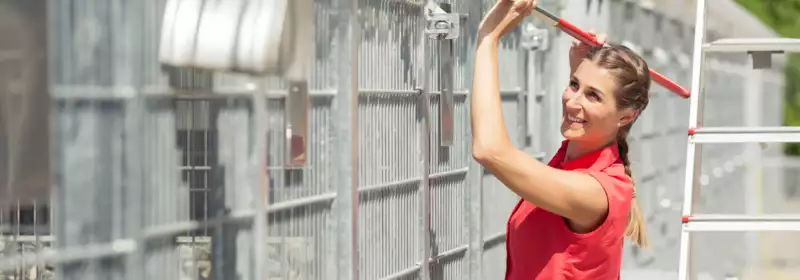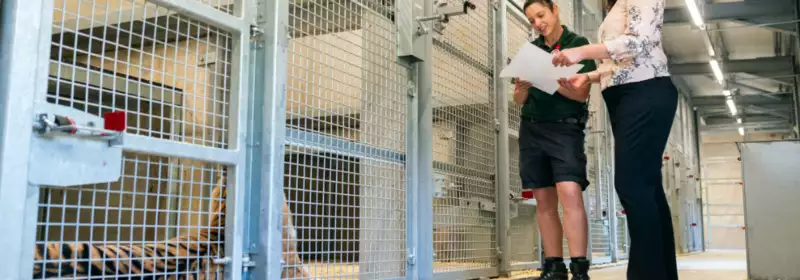The modern zoo is a far cry from the cliché images of the past. Then animals were held captive primarily for the amusement of onlookers.
Today, zoos carry out essential conservation work, supporting breeding programmes for endangered species around the world.
They also educate the public, giving them the opportunity to learn about these remarkable animals and how they can help.
For some animals, captivity is the safest place for them. Climate change, poaching and other factors have all made the outside world a perilous place.
However, thanks to zoo breeding programmes, previously endangered species are growing again in numbers. Like the Arabian Onyx, California Condor, Golden Lion Tamarin and Amur Leopard which have been successfully reintroduced into the wild.
So, a career working in a zoo or wildlife park is both important and rewarding. Not to mention working with some of these remarkable animals is the opportunity of a lifetime.
Some roles within zoos don’t require specific qualifications. However, if you want to work the areas described above you will need specialist knowledge. That means training to become a zookeeper.

What does a Zookeeper do?
The term zookeeper conjures up all sorts of images. Mostly of people with almost symbiotic relationships with animals and YouTube videos of grown lions hugging their keepers.
While this undoubtedly occurs, the reality is something quite different. Zookeepers in modern zoos must care for a host of animals including mammals, reptiles, amphibians, birds, insects and fish.
They must ensure their diet is balanced, rich in nutrients so all the animals are kept as healthy as possible. Equally, zookeepers must look out for signs of disease, injury or other indicators of ill health and take appropriate measures.
A zookeeper must maintain the cleanliness and good repair of enclosures. This helps to promote the health and well-being of the animals. It also ensures the safety of colleagues and guests.
Arguably one of the most important parts of a modern zoo’s remit is to establish successful breeding programmes.
Thanks to illegal poaching, climate change and other factors many animals are on the verge of extinction. Therefore, involvement in breeding and conservation programmes is one of the more crucial elements of their role.
This can involve working with other zoos both at home and abroad. As well as national parks where the animals will eventually be relocated.
It’s extremely rewarding work and something that motivates many to move into zookeeping.
But at its core, zookeeping centres on ensuring the health, safety, well-being and happiness of all animals in the park.

How do I become a Zookeeper?
It is possible to work your way up to a zookeeper from an entry-level position. However, going down the education route is often quicker.
By studying to be a zookeeper, you’ll gain essential knowledge, as well as learning the optimal approach to different situations. Moreover, many courses offer a practical placement so you can put what you’ve learned to the test.
This is beneficial as it gives you a proper taste of life working for a zoo. Which will help you decide if it’s the career for you after all.
Assuming it is, the placement can also lead to possible employment opportunities. Or at least some connections to help you get a job elsewhere. At the very least, working with some of the world’s most incredible animals will be an unforgettable experience.
To be a zookeeper you need a minimum of a higher education qualification or degree in a related subject. Generally, these are courses in zoo animal management or a zoological related science. For example, a level 3 diploma in Zookeeping.
Through courses like these, you’ll gain the essential knowledge required to work effectively within a zoo or wildlife park.
You’ll learn about animal welfare and ethics, conservation, the role zookeepers play in modern zoos, disease prevention, legislation and more.
From here you can start applying for zookeeping roles. However, competition is understandably fierce so it helps if you have prior experience or you can volunteer at weekends.
Paid roles can be hard to come by. However, most zoos and wildlife parks are grateful for a pair of willing hands. They won’t have you in with animals straight away but you’ll gain valuable insight into the running of the zoo.

Studying Online Courses
Online learning allows you to gain your qualification without the need to attend physical classes. This means you don’t have to juggle work or ask for time off to attend college.
Which can make things a little awkward if you’re planning on starting an entirely new career.
Traditional colleges usually run courses between September and June/July, spreading the learning out with a class or two a week. So, you have no choice but to learn at the pace set by the college and your tutor.
Online learning allows you to access your full course material any time of the day or night and study at your own pace.
Meaning you can learn when you’re at your most productive and can complete the course as quickly as you want.
You won’t have to wait a week to learn the next part of the course. This flexibility often enables students to complete the online part of the course in just a few months. You can then undertake your practical element and qualify shortly after.
Whether you’re training for a new career or upskilling, this approach allows you to qualify much quicker than normal.
learndirect is the UK’s leading distance learning online course provider. Supporting thousands of students in achieving their academic ambitions every year.
All you need to do is enrol and start your learning the same day. With online learning, all the materials are ready and waiting. You get to dictate how and when you study.
Get in touch with our sales team or sign up today online. There are flexible payment terms available to help you spread the cost.
You will also have access to a dedicated tutor who will help you through the process. Check out our blog for useful tips on how to get the most out of your study experience.
Click below to sign up to study your level 3 diploma in Zookeeping with learndirect today.



















